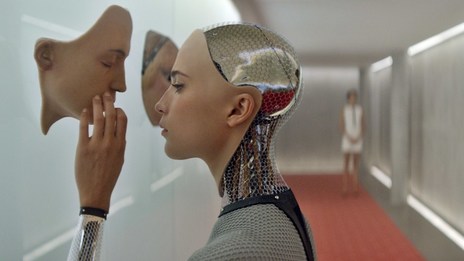A- | A programmer is summoned by his tech genius boss to test his AI creation. Directed by Alex Garland Starring Alicia Vikander, Oscar Isaac, and Domhnall Gleeson Initial Review by Jon Kissel |

Once the three players are established, Caleb grapples with how Ava, plainly independent and sentient, should be treated by Nathan. Aside from the ethical concerns, it's also apparent that Nathan and Ava are not telling him the whole truth. The retreat is stuffed with surveillance equipment, so it's impossible for Caleb to get a true response from Ava, except when the power occasionally goes out and Ava is given a few seconds of honesty. This Heisenbergian aspect of observer and observed proves itself as a vital part of the film. On the flip side, Nathan is vast levels of hierarchy above Caleb and treats him like the employee he is, utilizing a need-to-know back-and-forth with him despite the draconian NDA Caleb is made to sign. He brushes off Caleb's interest in the technical and tells him to focus on the emotional. When he does venture into the technical, Nathan tells Caleb that Ava is the natural end result of a search engine, as her software is constructed from search entries and camera phones, a level of intrusiveness way above Caleb's pay grade. That kind of consolidation into the single entity of Ava is a giant unspoken risk, forcing Caleb to weigh Ava's freedom against Nathan's precautions. He has made this thing because he can. What is the next step?
In this sci-fi chamber drama, Garland is meticulous with detail. Simple, spare images fill the movie. Nathan's dimly lit bedroom wall is covered in yellow post-its, alternate Ava faces adorn otherwise blank hallway walls, and power outages are accompanied by a bath of red light. There's symmetry in every shot, with no mess cluttering up the frame. Smooth lines turn into sharp corners. Conversely, Jackson Pollock's famous painting plays a role, a seemingly random squiggle of color made free-form and without a plan, the only thing like it the retreat. It's an appealing, if cold, look that makes frames stand out even while it makes interest flag somewhat during the runtime.
As Ex Machina's two sources of mystery, Isaac and Vikander exhibit vast depths. Both exude an unknowable quality demonstrative of their characters' genius. Isaac seemingly can't miss, and this is another excellent role from him. His Nathan has an earned arrogance and unsentimentality beneath his friendly bro exterior. He withholds information while also demanding that nothing goes unsaid from his counterparts. Isaac plays Nathan as both rational and unpredictable, particularly in a tense scene that builds to a choreographed disco dance. Nathan filled Ava's brain with the combined Vines and selfies of billions of people, so she should have complete control over her face. Vikander is up to the task in an even-keeled and interesting performance. Her sessions with Caleb vacillate between courtesy, curiosity, frustration, and fear, and though her voice retains a level of otherworldly calm, her subtle facial changes completely sell the human within the robot. In the audience surrogate role, Gleeson has the least to hide in a film where everyone else is holding something back, and therefore makes the least impression. He ably communicates his gratitude and wonderment at this opportunity of a lifetime, but he is outshone by Isaac's and Vikander's ambiguity.
Ex Machina is a thought provoking entry into Garland's impressive resume, even if it's colder and more sterile than his work with Danny Boyle or Mark Romanek. The script contains much to unpack, as the complex topic of AI is one that might inform the next chapter of human existence. A creator assuming god-like powers to make something with god-like power is fertile ground for drama, and Garland has produced an entry worthy of cousins like 2001 and Her. B
 RSS Feed
RSS Feed